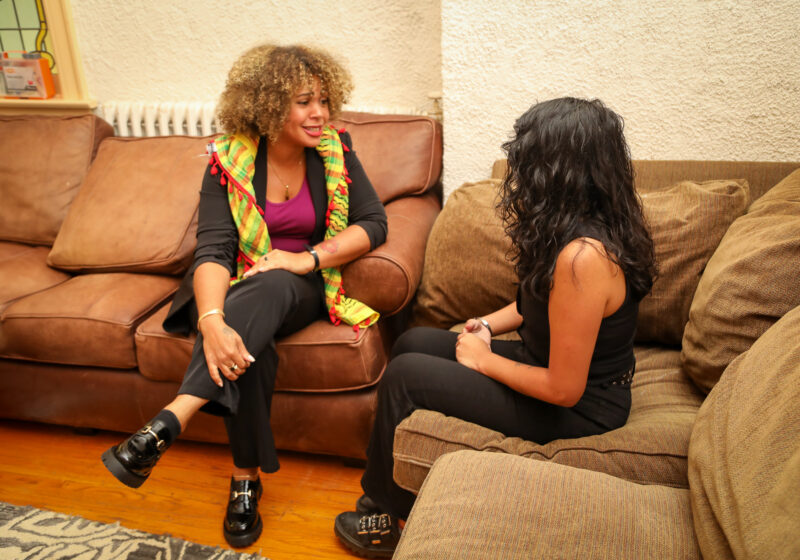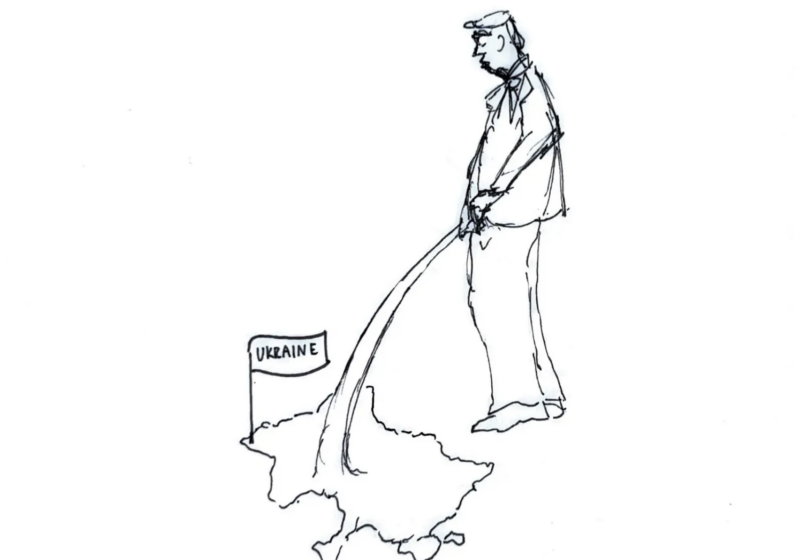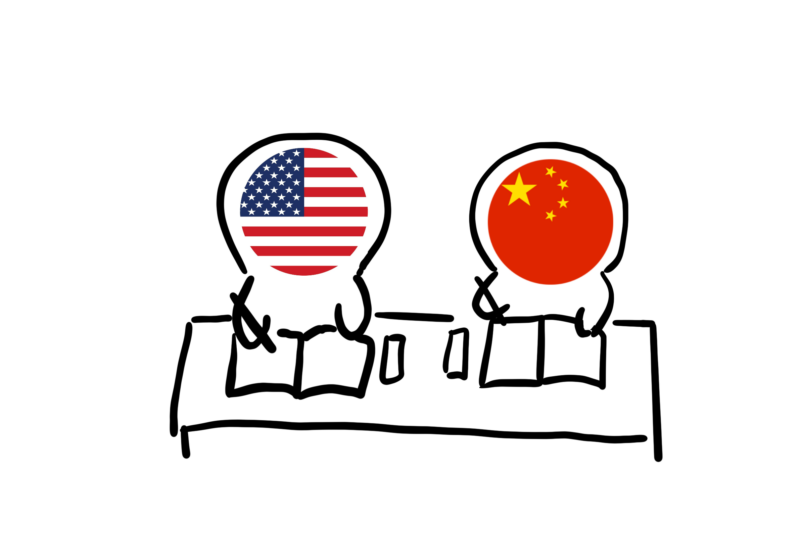The 2024 Presidential Election Campaign Season is in full swing, and front runners Kamala Harris (D) and Donald Trump (R) are currently polling closely. Despite most coverage focusing on Harris and Trump, some third-party candidates have been making a wave.
Claudia De La Cruz is currently running as a third-party candidate for the Party for Socialism and Liberation (PSL). De La Cruz’s background lies not in politics, but in a long history of social activism in advocating for issues like reproductive health and in support of Palestine.
De La Cruz is on a circuit of region-specific campus tour visits, currently visiting college campuses in upstate NY. Although De La Cruz was originally announced to be visiting UR, she could not come to campus because of the University’s policy on political activities. Nonetheless, the Campus Times had the opportunity to sit down with De La Cruz for an interview.
What motivated you to run for the presidency, considering your background is mostly in activism and not any other campaigns?
What motivated me to run is what motivates the party to be active in electoralism and be active in electoral politics, which is basically the need to uplift the demands and needs of the people, which is not done by any of the two corporate parties. They do not speak about the fact that the minimum wage in this country has not been raised since 2009, and that actually there are, again, over 160 million people in this country who are living in or below poverty. They always talk about a middle class that is disappearing increasingly in this country and never actually address the needs, the concerns of working-class people.
So, we run to uplift the demands and to let people know that there are options and that they do not have to continue to validate the mediocrity of the two-party system.
Do you think your history of activism does give you a unique perspective on campaigning?
I think the fact that I’m a working-class person [does]. The story is always, ‘I came from the middle class.’
I came from a working-class background. But these are people that have multi-million dollar accounts that are personal accounts. They’re no longer working-class people.
They are no longer people that are accountable to the majority of people in this country. And I think that, yeah, my activism, my organizing, the people that I surround myself with, the fact that I’m part of the political organization that I am, have a lot to do with my perspective. But the fact that I have to get off this campaign trail and go home and still do laundry and still go to the grocery store and experience the price gouging of these corporations, the fact that I have to pay my electric bill that is a surmounting amount of money for the type of service that they give me, gives me the perspective of working-class people that are struggling with the same things.
We cannot expect people who are way far off whatever working class people experience to be able to solve our needs, because they are way far removed from that reality.
What would you say to people who really believe that there is no point in voting for a third party and only voting in the two-party system?
I would ask those people, ‘What is the point of voting two parties?’
Have they raised the minimum wage since 2009? Have they actually addressed the questions of violence in our communities? Have they eliminated police brutality, mass incarceration?
Have we seen more access to health care? Have we seen the shutting down of clinics all across this country? Have we seen the private motive and the profit motive of our education system?
Are students paying less for loans in their college spaces? I would say no. So, if you say no to any of these things, then what actually is the use of the two-party system except for continuing to validate and promote and uplift the corporate agenda, the agenda of billionaires, the agenda of the military-industrial complex?
And so, again, I’ll refer to the Princeton University report that said that public opinion equates zero to the development of policy in this country. But what does matter is the corporate agenda. What does matter are the wealthiest sectors of society.
And this was a Princeton University report that said that. It wasn’t me. And so, again, voting in this country, within this democratic system, is a form of consenting to the things that they do against us.
And third parties are part of a counter to those things. For example, the two parties that are currently in all the ballots are the ones that are promoting genocide, that are promoting the expansion of war, that are promoting attacks on immigrants in this country. And if we believe that that’s what we need in this country, then we vote for them.
But if we don’t believe that, there are third-party options.
Even now, you’ve been involved in on-campus protests and off-campus protests advocating for Palestine and now Lebanon. That’s where you were before this. Is this your most important issue?
I was doing it before. I’ve been doing this since I was 17 in terms of the solidarity work with Palestine. I’ve been organizing for 30 years. I started at 13.
This is what I was doing before the campaign. This is what I’m going to be doing.
So, you know, this is a lifelong march. A lot of people who I consider to be ancestors and people that I consider to be comrades took on this task 60 years ago, 70 years ago. Whatever little we have, people who are Indigenous, who are immigrants, who are Blacks, that actually have access to college education, have that access to education because people struggled for that.
None of that was given to us. And so I believe in the most internal parts of my being that if we don’t fight for things, we don’t get it. And so this struggle around the freedom of Palestine is a very long struggle that has been here for 76 years.
And the worst thing that we could do as we approach one year of this genocide is give them space to demoralize us. We have to continue to fight as they expand. Now, you asked a question, and it reminds me of a question that people are asked often.
Is this a single issue? No, genocide is the issue because it shows us that they have the capacity to annihilate, to exterminate an entire population. What do you think will happen to us?
What do you think is happening to us in the ways in which our people are being gentrified, in the ways in which our people are being incarcerated, in the ways our people are being exploited? All of those things are ways of committing genocidal acts. And so if we can’t see the connections now, once they have exterminated the Palestinians, which we will not allow to happen, they will come to us. And so we need to be conscious of the fact that the same forces that are oppressing us, and that are causing us misery in this country, are the same forces that are conducting genocide across the seas.
There have been past claims connecting the People’s Forum (which advocates for social change by providing a political education and cultural space for nonprofits and grassroots initiatives) and by extension, you and Goldman Sachs, which have been disavowed. Because of that, constituents have raised concerns about Goldman Sachs funding this campaign. What is your response to those claims?
There is a tweet of Goldman Sachs that disassociates itself from the People’s Forum, which is the organization that I co-directed and co-founded.
People have banks in a capitalist system. If you get paid, your money goes to a bank if you receive direct deposit. Does that money belong to the bank or does it belong to you?
And so in the capitalist system, if you receive donations that are beyond a certain amount, you have to use what is called a donor’s fund. And for us, the donor’s fund was Goldman Sachs. That is the bank that held the money for the People’s Forum, not the Vote Socialist Campaign 2024.
And I would say to people who follow those threads to do much more digging into what things are and what they are not. The Party for Socialism and Liberation, which is the party that is running the ballot of the Vote Socialist 2024 campaign, is a completely different entity than the entity that I co-founded and co-directed, which is the People’s Forum. The Party for Socialism and Liberation is an organization that is member-funded.
When I mentioned earlier that each of these challenges that we’re facing in court has basically depleted a lot of the funds that have come into the campaign, I really mean it because the campaign is people-powered, it’s people-funded, it’s not funded by any capitalists or any donations that are coming from any fund philanthropy or anything of that sort.
Why has your focus been on college campus-specific tours like the New York College Campus Tour right now?
That’s been the least of the spaces that we’ve been in. We’ve been in a lot of different communities. In South Carolina, this is a community that has high levels.
I think it’s the second highest level of people who have confronted the reality of having their limbs cut off because of diabetes in this country. We’ve met with labor organizers in North Carolina, in New York City, in the Bay Area. We’ve gone to college campuses. We’ve gone to high schools. But we’ve also met with a lot of communities that are struggling, a lot of educators, a lot of organizers, and also people who are not necessarily knowledgeable of the campaign. We’re trying to share more information about the platform and share more information about the need to build socialism in this country.
The reason that we did this specifically around the college tour is that there has been an increasing amount of young people who have engaged in the fight back against genocide that have been hit very hard by their institutions. And so it also has been revealed in the last 11 months that a lot of these institutions serve to reproduce capitalist values and ideas. And there’s a lot of young people that are completely against that. And so we want to validate them in their struggle and say, you’re not crazy. Actually, the institutions are the ones that are acting against the people. And I know there are some issues actually getting on the university campus.
Some campuses are more troubling than others. I think that, you know, universities historically are very good at keeping the people and the people’s struggles out of the universities.
Columbia University, which is where I went, is very good at that. It has very big gates all around Columbia University. And it’s actually, you know, very particular in terms of who they let in. They let the Minutemen in 2006, which is a fascistic anti-immigrant organization, but they wouldn’t let students who are protesting genocide actually take over a lawn to protest. And so they’re very particular. It’s something that is not unexpected. But, again, it reveals the very undemocratic character of these institutions and who they are really aligned with.
You weren’t able to step foot at the University of Rochester, and couldn’t visit the campus due to the University’s policy on political activities. What are your thoughts on restrictions on political campaigns in institutions like this?
I think in general, these are nonprofit organizations, obviously. And I say that loosely.
I say that with air quotations. They say that they cannot allow electoral politics on campus, yet they do exercise the type of politics that is against the people, the students, and people who struggle. And so there’s nothing more political than that in practice.
And so, for us, the question of these institutions and how they relate to politics is very, like, they’re very superficial in the sense that they will say that they don’t support, you know, electoral politics and that they can’t promote. But there’s a possibility of doing educational teachings. And so it scares them that there are students who are there to reproduce the capitalist system who actually learn about another option and another way of doing things that is not the way that the education system historically presents.
What would you say you would have learned from visiting all these college campuses?
In general, young people, people talk about, people often say as a cliché slogan, students and young people are the future. And I don’t necessarily think that is true.
I think students and young people are the now. And whatever we do now to be able to elevate how people think in relationship to themselves, their communities, and the world is what ultimately will build strong people that can respond to crisis. Young people have had the ability in the last 11 months to do things that many other generations didn’t do, which was uplift and break, break the isolation of the universities and the people.
They bridged it. A lot of the movement and the energy that was built in demonstrations in the streets came into the college campuses. And it came into the college campuses because of the consciousness of the young people in those spaces.
And so if we are focusing some of our campaign journey to visiting these spaces, universities, it’s because we believe and we have seen hope in that. Every time I go in and I meet with students that have been organizing around the question of Palestine, but also students that have been organizing for labor rights as graduate students — that fills me with hope because there are people that are willing to fight within these institutions to be able to transform the reality. And so I’ve learned a lot from students.
I’ve learned that they have the ability to transform things now, that they actually understand the need for organized struggle, and that they have the capacity to bridge struggles that are happening in the university space with struggles that are happening outside of those spaces. And that fills me with enough hope to say that our future is guaranteed if they continue to fight.
Is there any last statement you want to leave constituents with?
The most important thing to say is that the proof is in the pudding.
When you want to judge people, organizations, and politicians, you look at what they do and what they have not done. And you look at the consistency of their work. Never believe words.
Believe deeds. And believe the people who are able and willing, and have had the capacity to withstand moments of crises, and still struggle, still fight, and are still betting on our ability as a collective force of history to make the transformation happen.
The Campus Times does not endorse any political candidate.







